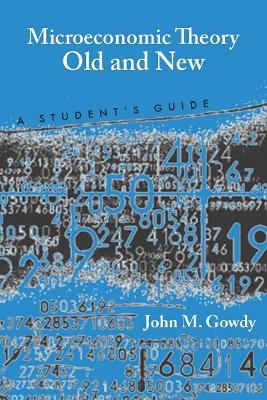
Microeconomic Theory Old and New
A Student's Guide
Seiten
2009
Stanford University Press (Verlag)
978-0-8047-5883-3 (ISBN)
Stanford University Press (Verlag)
978-0-8047-5883-3 (ISBN)
This book presents the core model of contemporary economic theory and policy, Walrasian economics, and presents a systematic behavioral and theoretical critique of that system.
Microeconomic Theory Old and New: A Student's Guide has two main goals. The first is to give advanced undergraduate and graduate students an understanding of the core model of economics: Walrasian general equilibrium theory. The text presents in detail the three building blocks of Walrasian theory—establishing Pareto efficiency in a barter economy, establishing the efficiency of competitive markets, and accounting for market failure. Each is discussed verbally, graphically, and using mathematics. After reading this book, students will have an understanding of how the seemingly disparate pieces of conventional economics fit together as a system. Although the text focuses on the intellectual framework of standard economic theory, relevant mathematical techniques are discussed.
The second goal is to present contemporary extensions and emerging alternatives to the Walrasian model. Some of the theoretical inconsistencies in the model are presented, drawing on the work of Samuelson, Boadway, Chipman and Moore, Ng, and Suzamura, among others. The text then presents challenges to the basic assumptions of the Walrasian system, posed by findings in behavioral economics and evolutionary game theory.
Understanding both the Walrasian system and the theoretical and experimental critiques of classical economics is essential to those who ultimately work within the traditional framework and to those looking for an alternative, making this a must read for all students of economics.
Microeconomic Theory Old and New: A Student's Guide has two main goals. The first is to give advanced undergraduate and graduate students an understanding of the core model of economics: Walrasian general equilibrium theory. The text presents in detail the three building blocks of Walrasian theory—establishing Pareto efficiency in a barter economy, establishing the efficiency of competitive markets, and accounting for market failure. Each is discussed verbally, graphically, and using mathematics. After reading this book, students will have an understanding of how the seemingly disparate pieces of conventional economics fit together as a system. Although the text focuses on the intellectual framework of standard economic theory, relevant mathematical techniques are discussed.
The second goal is to present contemporary extensions and emerging alternatives to the Walrasian model. Some of the theoretical inconsistencies in the model are presented, drawing on the work of Samuelson, Boadway, Chipman and Moore, Ng, and Suzamura, among others. The text then presents challenges to the basic assumptions of the Walrasian system, posed by findings in behavioral economics and evolutionary game theory.
Understanding both the Walrasian system and the theoretical and experimental critiques of classical economics is essential to those who ultimately work within the traditional framework and to those looking for an alternative, making this a must read for all students of economics.
John M. Gowdy is the Rittenhouse Teaching Professor of Humanities and Social Science in the Department of Economics at Rensselaer Polytechnic Institute. He is President of the International Society for Ecological Economics 2010-2011. Gowdy has published nine other books, including Paradise for Sale: A Parable of Nature, co-authored with Carl McDaniel.
| Zusatzinfo | 1 table, 45 figures, 14 illustrations |
|---|---|
| Verlagsort | Palo Alto |
| Sprache | englisch |
| Maße | 152 x 229 mm |
| Gewicht | 454 g |
| Themenwelt | Wirtschaft ► Volkswirtschaftslehre ► Mikroökonomie |
| ISBN-10 | 0-8047-5883-2 / 0804758832 |
| ISBN-13 | 978-0-8047-5883-3 / 9780804758833 |
| Zustand | Neuware |
| Haben Sie eine Frage zum Produkt? |
Mehr entdecken
aus dem Bereich
aus dem Bereich
Wirtschaftszusammenhänge verstehen und mitreden können
Buch | Softcover (2023)
Wiley-VCH (Verlag)
19,99 €
die psychologischen Determinanten menschlicher Entscheidungen
Buch | Softcover (2024)
Kohlhammer (Verlag)
39,00 €


